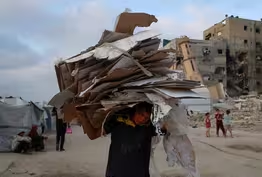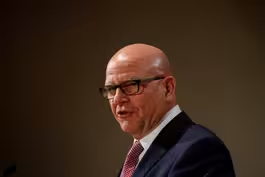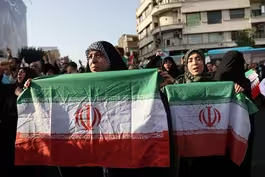
A look inside the U.S.’ unprecedented direct attack on Iran
Clip: 6/22/2025 | 4m 52sVideo has Closed Captions
What we know about the U.S.’ unprecedented direct attack on Iran
The Middle East stands at a pivot point Sunday after the Trump administration launched airstrikes on three of Iran’s largest nuclear sites. In response, Iran said the time for diplomacy is over and hinted at military retaliation against the United States. Nick Schifrin reports.
Problems playing video? | Closed Captioning Feedback
Problems playing video? | Closed Captioning Feedback
Major corporate funding for the PBS News Hour is provided by BDO, BNSF, Consumer Cellular, American Cruise Lines, and Raymond James. Funding for the PBS NewsHour Weekend is provided by...

A look inside the U.S.’ unprecedented direct attack on Iran
Clip: 6/22/2025 | 4m 52sVideo has Closed Captions
The Middle East stands at a pivot point Sunday after the Trump administration launched airstrikes on three of Iran’s largest nuclear sites. In response, Iran said the time for diplomacy is over and hinted at military retaliation against the United States. Nick Schifrin reports.
Problems playing video? | Closed Captioning Feedback
How to Watch PBS News Hour
PBS News Hour is available to stream on pbs.org and the free PBS App, available on iPhone, Apple TV, Android TV, Android smartphones, Amazon Fire TV, Amazon Fire Tablet, Roku, Samsung Smart TV, and Vizio.
Providing Support for PBS.org
Learn Moreabout PBS online sponsorshipJOHN YANG: Good evening, I'm John Yang.
Tonight the Middle East stands at a pivot point.
The administration says Operation Midnight Hammer severely damaged or destroyed the Iran's largest nuclear sites.
In response, Iran says the time for diplomacy is over and hits hints at military retaliation against the United States even as more missiles from Iran strike Tel Aviv.
Our coverage tonight begins with foreign affairs and defense correspondent Nick Shifrin.
NICK SCHIFRIN (voice-over): The U.S. S unprecedented direct attack on Iran began under the cover of darkness.
A dozen B2 bombers flew 30 hours with multiple midair refueling, all under strict operational security, including a decoy.
The bombers launched from Whiteman Air Force Base Friday night at midnight, flying east at the same time B2S also launched west tracked on social media.
But that was deliberate deception to allow the main bombers to fly to Iran undetected and alongside dozens of fighter jets target Iran's key nuclear enrichment sites at Natanz and Fordow where thousands of advanced centrifuges spin hundreds of feet underground.
For the first time in combat, the U.S. dropped 14 30,000 pound Massive Ordnance Penetrators designed to dig deep before exploding.
This satellite image shows at least half a dozen precise impact sites at Fordo where bombs landed before exploding deep underground.
A third target, Isfahan, believed to hold Iran's enriched uranium stockpile targeted by submarine launched Tomahawk missiles.
GEN. DAN CAINE, Chairman, Joint Chiefs of Staff: This operation was designed to severely degrade Iran's nuclear weapons infrastructure.
Initial battle damage assessments indicate that all three sites sustained extremely severe damage and destruction.
NICK SCHIFRIN (voice-over): At the Pentagon today, Chairman of the Joint Chiefs General Dan Caine and Secretary of Defense Pete Hegseth called the mission limited and designed to convince Iran to negotiate.
PETE HEGSETH, U.S. Secretary of Defense: This mission was not and has not been about regime change as the President has directed and made clear.
This is most certainly not open ended.
There are both public and private messages being directly delivered to the Iranians in multiple channels, giving them every opportunity to come to the table.
NICK SCHIFRIN (voice-over): But Foreign Minister Abbas Araghchi today said Iran had no intention to sit down.
ABBAS ARAGHCHI, Minister of Foreign Affairs, Iran of course the door for diplomacy should be always keep open.
But this is not the case right now.
My country has been under attack, under aggression and we have to respond.
NICK SCHIFRIN (voice-over): This morning, Tel Aviv absorbed the brunt of Iran's response.
Iranian ballistic missiles tore through these apartments.
Nobody died, but dozens were wounded.
Iran could escalate further against Israel or target U.S. bases across the region, where some 40,000 troops are on high alert.
In the past, Iran has tried to choke off global oil supplies, actions that would bring further U.S. Military strikes.
Secretary of State Marco Rubio warned today.
MARCO RUBIO, Secretary of State: There are no planned military operations right now against Iran unless they mess around and they attack American or American interests, then they're going to have a problem.
NICK SCHIFRIN: And Iran remains extremely vulnerable if the U.S. were to decide to launch more attacks.
The U.S. military today said that despite sending dozens of B2 bombers and fighter jets into Iran, there was no evidence Iran fired a single shot at any of those planes.
John?
JOHN YANG: Nick, is there any assessment yet about how far this has set the Iran nuclear program back?
NICK SCHIFRIN: Last night, we heard from President Trump that the sites were, quote, totally obliterated.
You heard a more calibrated description today in our piece from the Chairman of the Joint Chiefs Dan Caine, saying that there was, quote, severe damage.
Military officials tell me simply it's too early to have a proper battle damage assessment.
But we do know one thing.
Vice President Vance said today something interesting.
He acknowledged the U.S. did not target Iran's highly enriched uranium stockpile that is held at least partially, in Isfahan.
You see some file video from Isfahan right there.
That's essentially the fuel that Iran could use to build Iran if it decided to do so.
Experts told me the Tomahawks that struck that facility were not capable of actually getting underground enough to destroy that stockpile underneath.
So we know for sure at least part of the stockpile survives.
Some experts believe, John, that this will convince Iran that once and for all, it does need to go after weaponization of a nuclear bomb.
But today, Rubio said if Iran made that decision, regime change would be back on the table.
JOHN YANG: Nick Schifrin, thank you very much.
NICK SCHIFRIN: Thank you.
Desperation mounts as Gazans are killed while seeking aid
Video has Closed Captions
Clip: 6/22/2025 | 4m 45s | Desperation mounts in Gaza as Palestinians are killed while seeking food aid (4m 45s)
Former national security adviser analyzes U.S.-Iran strikes
Video has Closed Captions
Clip: 6/22/2025 | 6m 8s | Former national security adviser analyzes U.S. airstrikes on Iran (6m 8s)
How Iran could respond to U.S. strikes on its nuclear sites
Video has Closed Captions
Clip: 6/22/2025 | 4m 52s | How Iran could respond to U.S. strikes on its nuclear sites (4m 52s)
News Wrap: Gunman killed after shooting into Michigan church
Video has Closed Captions
Clip: 6/22/2025 | 2m 29s | News Wrap: Gunman killed after shooting into Michigan church (2m 29s)
Providing Support for PBS.org
Learn Moreabout PBS online sponsorshipSupport for PBS provided by:
Major corporate funding for the PBS News Hour is provided by BDO, BNSF, Consumer Cellular, American Cruise Lines, and Raymond James. Funding for the PBS NewsHour Weekend is provided by...















